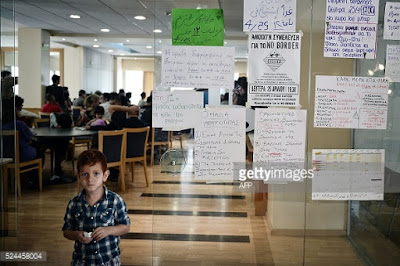 |
| The smart cafés are deserted today |
Today I went to Victoria Square shortly after midday. As usual, the smart café tables were empty: this is no longer a chic place for people-watching. The waiters were standing around looking forlorn.
 |
| Victoria Square in better days |
Victoria Square used to be a calm place to meet, enjoy the peace and quiet and admire the neat beds and well-trimmed lawns
 |
| Victoria Square today - the refugee rendezvous |
Yesterday, the public benches all around the formally planted beds were occupied by Afghans and Syrians, families and children, young men talking football, women talking babies.
I talked to one Afghan man who spoke pretty good English, though he described himself as having been a farm worker, back in Afghanistan.
I’ve been here three years,” he said “on and off, to and fro between Greece and Turkey.”
I asked him why he wanted to leave Afghanistan. “Too much bombing. Every day: Boom Boom. Taliban and Daesh. Not safe in Afghanistan.”
I asked him about his family. “They at home, they stay out of trouble areas. In Afghanistan, if I move to go to work it is too dangerous: bombs and fighting. I want to get to safe country, find work, make home, bring my family.”
 |
| Glass doors serve as notice boards for information updates |
The people I work with refer to this hotel as a “squat,” but that word for me has a chaotic tone to it and this Plaza Hotel feels organised and hospitable. It is something of a shock to observe Syrian and Afghan families sitting around in the comfortable lounges and dining areas, looking somewhat bemused after all the time they have spent on the road, in camps – or in Victoria Square.
 |
| A safe place for children to play |
I hope to be teaching here soon, once or twice a week, running conversation classes in English and German – and French if there is the demand for it.
For the present, none of these refugees is going anywhere. The land borders to the north are closed, and the asylum registration process is laborious and clogged with an overload of applications and a near-total lack of interpreters.
Back in the Square tempers flare and a scuffle breaks out. It’s pretty much inevitable when people have been spending weeks just hanging around and waiting, bored and falling victim to over-optimistic rumours. Friends of the combatants pull them apart, and the shouting subsides down to conversational level as the topics return to football and babies.
There is a temptation to assert that we British were so much better behaved when we were suffering in the blitz, but there is one major difference. We were a nation that had leadership and purpose from a wartime government: these people in Athens are a flock without a leader. The Syrian leader is bombing his own people, in Afghanistan there is ongoing civil war and armed uprising. Such information as these refugees are fed from time to time has frequently proved to be inaccurate and unreliable. They are in a void, in limbo, with no hierarchy that cares about them or for them.
Except, that is, for the volunteers – a motley band from Netherlands, Ireland, Britain, Canada –almost anywhere and everywhere, who have come to try and give some structure to the lives of these people whom the world is trying to forget. Some of these volunteers make significant sacrifices to be here; some put their careers on “hold” for a few months, others have never known anything other than moving from one crisis zone to another to play with children, to comfort the distressed, to negotiate with bureaucracy.
These people inspire me and give me hope that perhaps this generation who grew up around the turn of the millennium, perhaps these idealists will teach society that there is so much more to life than WORK : PRODUCE : EARN : SPEND :::: WORK : PRODUCE : EARN : SPEND.
At 72, I am the grandfather of the show; I play my part when I can, but it is these people (who are almost all younger than my youngest child) who are setting the policies and organising the interventions.
In a world which is patently ruled by consumption, and where society is almost entirely focused on personal gain and displayed materialism, it is gratifying to realise that there are some people around, like such volunteers, who live their lives by trying to raise up those who have less in life. Those of us from an earlier generation realise in the end that such activity is actually far more satisfying than living your life trying to fight your way up, to be on a level with those who have more.
Brussels: Berlin: Paris: Westminster: - somebody has to break the deadlock.
Let’s start with the unaccompanied children,
and let’s turn Eurostar into a 21st century “Kindertransport.”
Keep on making your voice heard Bob, the UK needs to LISTEN rather than just hear.
ReplyDeleteNicely written blog — though I think it's ironic that WORK : PRODUCE : EARN : SPEND is just what, I imagine, the refugees are wanting to do.
ReplyDelete